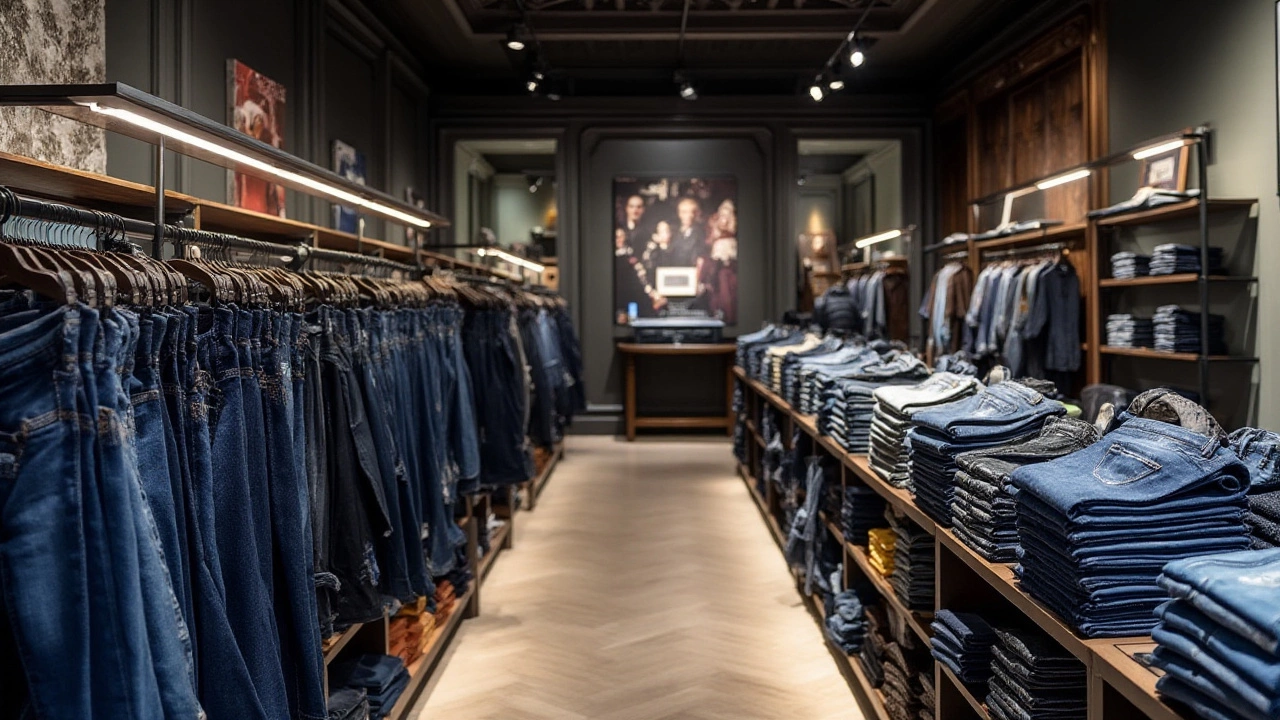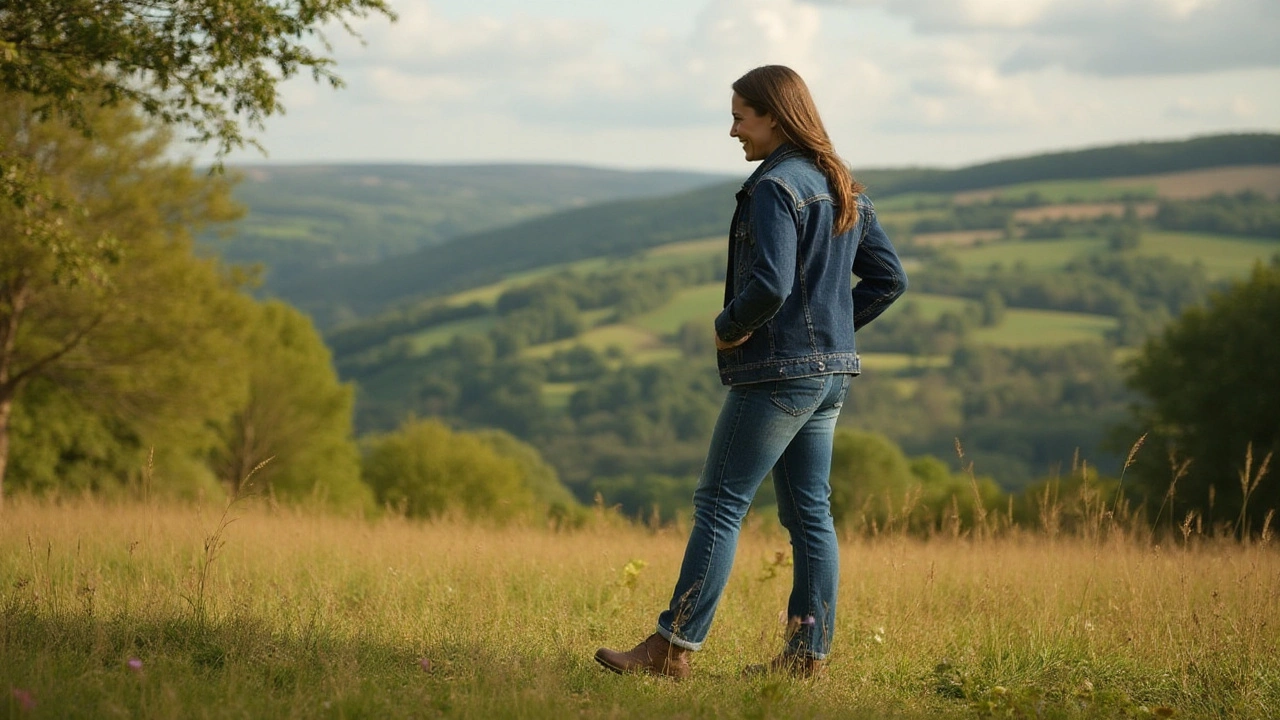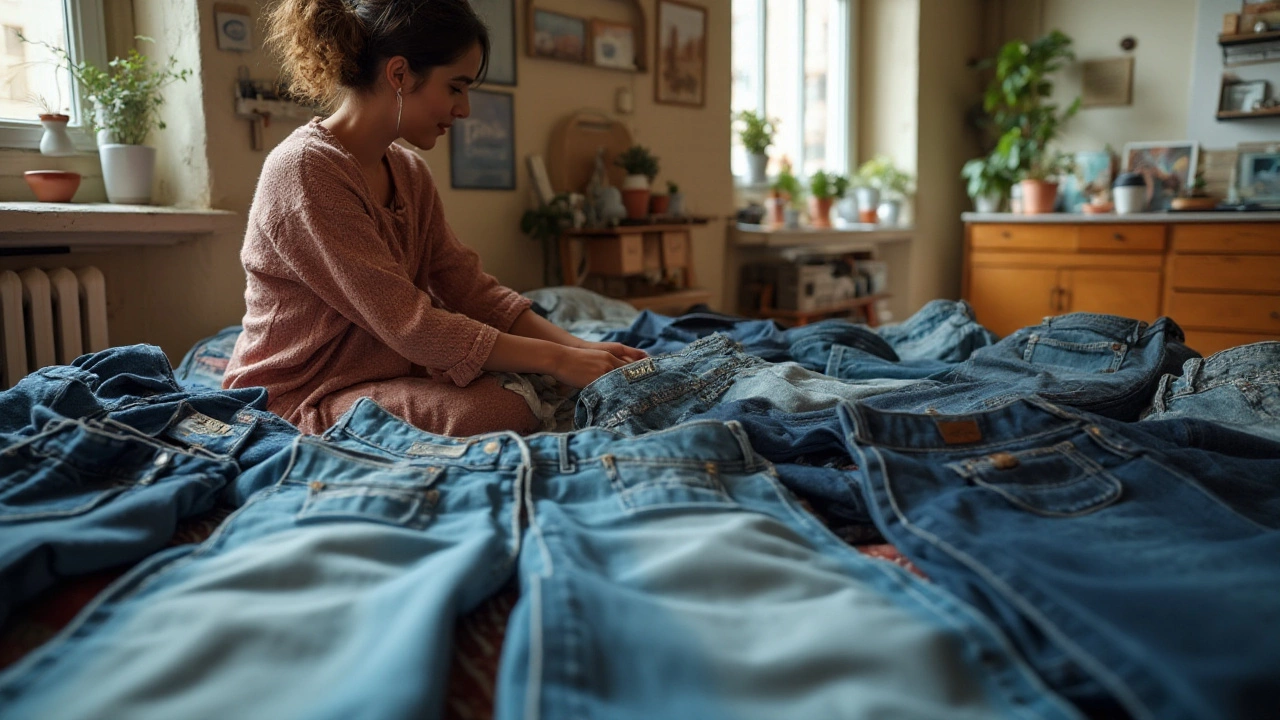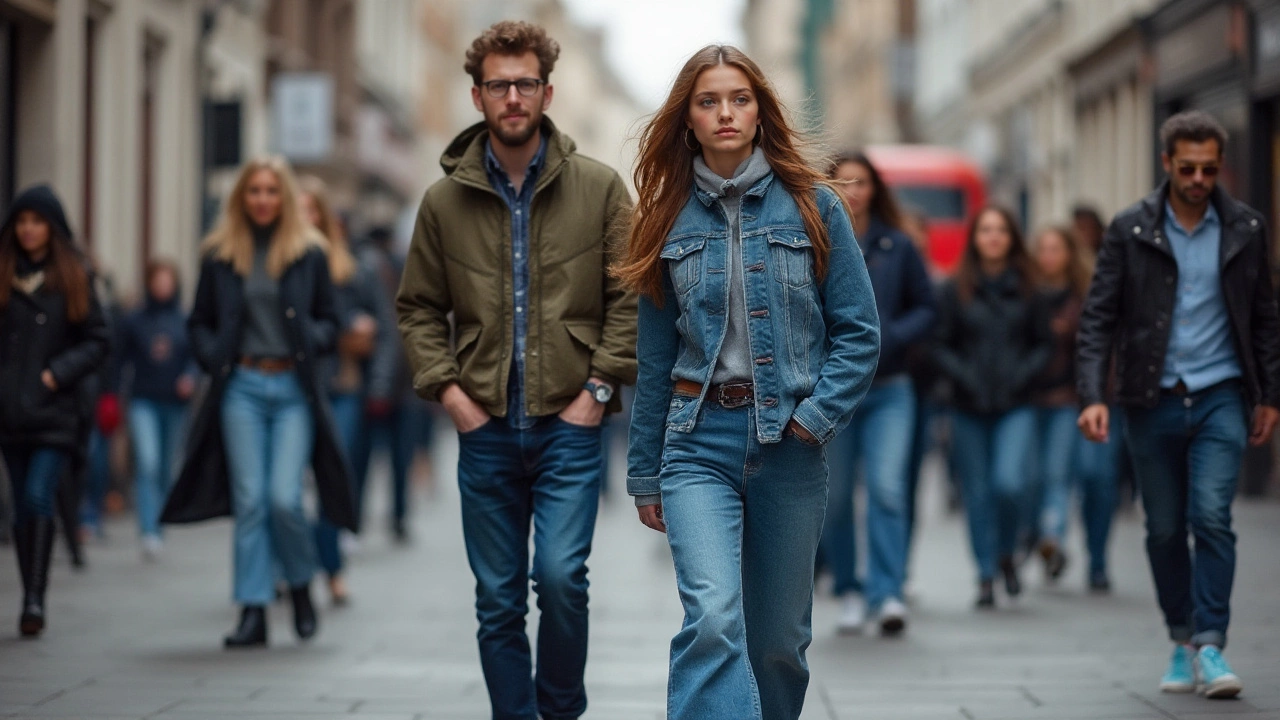Jeans, once a humble workwear staple, have transformed into an iconic symbol of fashion and comfort. As the years roll by, certain brands have managed to carve a niche for themselves in the ever-evolving denim landscape, capturing the attention of both fashion-forward trendsetters and everyday wearers.
From historic names that have stood the test of time to fresh faces making waves in the industry, there's an abundance of choices when it comes to picking out the perfect pair. This article will unravel the stories behind these brands, revealing what sets them apart and keeps them at the forefront of the market.
- Iconic Denim Brands
- Trends in Jeans Styles
- Denim Quality and Sustainability
- Choosing the Right Jeans
Iconic Denim Brands
The world of popular jeans stretches far beyond mere fabric and stitching. It is a universe made vibrant by brands, each with a unique narrative that shapes its identity and appeal. Take Levi's, for instance. In 1873, Levi Strauss transformed denim into a staple by introducing the first pair of riveted jeans. Today, they remain a symbol of timeless style and revolutionary craft. Iconic for their red tab and classic 501 models, Levi's is not just a brand; it’s a testament to enduring fashion trends.
Another heavyweight in the denim arena is Wrangler. Established in 1947, this brand has become synonymous with rugged durability, particularly adored by the rodeo community. The flame-resistant jeans from Wrangler are a nod to both safety and style, straddling fashion and functionality. Indeed, comfort and resilience are at the heart of Wrangler's appeal, making it a beloved choice for millions who seek quality that lasts.
Then there's the story of Diesel, an Italian brand that dared to disrupt the denim market with its daring designs and edgy aesthetic. Founded in 1978 by Renzo Rosso, Diesel quickly became an emblem of youthful rebellion, offering jeans that are not just worn but experienced. Their pioneering approach to branding, often using provocative, avant-garde advertising, has set them apart in a crowded field.
"Diesel changed the denim game by making each pair an art piece," fashion historian Aline Miron stated. "They transformed jeans into a bold statement for the forward-thinking individual."
Let's not overlook the British brand, Lee Cooper, which holds the distinction of being Europe's first major jeans manufacturer. Established in 1908, Lee Cooper jeans have long been celebrated for their authentic denim craft, maintaining a commitment to quality craftsmanship. Their strategic partnerships with musicians and artists in the 1980s helped cement their place in cultural and fashion history, binding them closely with rock and roll.
Finally, the Swedish brand Nudie Jeans brings sustainability to the forefront. Known for its organic and ethical jeans production, Nudie Jeans gives the industry's environmental footprint a meaningful nod. Their promise of free repairs for life highlights a commitment to both consumers and the planet, presenting an alternative narrative in the denim industry. Their transparency regarding production processes resonates with those who seek accountability in fashion.
These brands, through innovation, storytelling, and commitment to their ethos, illustrate the dynamic nature of denim brands. Each one has carved its identity, contributing to the rich tapestry of the jeans landscape. Their stories remind us that jeans are more than just a wardrobe essential. Each brand's journey adds a nuanced layer of culture, reflecting contemporary values while also shaping individual and collective identity in the world of fashion.

Trends in Jeans Styles
Over the years, the world of denim has seen a kaleidoscope of trends, each one reflecting changing societal moods, cultural shifts, and innovative breakthroughs in fabric technology. The popularity of jeans as a wardrobe staple is in no small part due to their chameleonic ability to adapt to new styles while maintaining a timeless appeal. Recently, we have seen the resurgence of classic cuts with a modern twist. For instance, the high-waisted, straight-leg denim that dominated the fashion scenes of the '90s has made a remarkable comeback. This nostalgic trend has been spurred by a collective yearning for comfort, empowerment, and a sense of retro charm in our daily wear.
In contrast, the past few years have also witnessed unprecedented innovation with the rise of sustainable and eco-friendly jeans styles. Driven by a growing consumer awareness of environmental issues, many leading brands are crafting garments from recycled materials, employing water-saving techniques, and minimizing waste. These efforts have given rise to styles that not only look good but also do good for the planet. As the desire for personalization grows, custom-made jeans that offer unique fits and embellishments are gaining traction, and brands are accommodating these preferences through sophisticated online tools that enable consumers to tailor jeans to their own specifications.
The jeans industry has also been significantly influenced by social media and influencer culture, which have played pivotal roles in shaping and popularizing current trends. From TikTok videos to Instagram reels, influencers are showcasing the versatility of denim - pairing skinny jazz-inspired jeans with oversized blazers for a polished-off duty look or styling wide-leg pairs with crop tops for a chic and relaxed fit. This dynamism has allowed jeans to remain at the forefront of style, serving as a canvas for self-expression and creativity.
Interestingly, the fluctuating cycle of trends has not overshadowed the timeless appeal of some classics. According to a recent survey, skinny jeans, despite debates about their era being "over," retain a loyal fanbase in the younger demographic. Present-day interpretations are adding edgy elements such as distressed details or striking washes that stand out, showing that even staple items can evolve.
Sara Carr, a notable fashion analyst, recently remarked, "The beauty of denim lies in its ability to constantly reinvent itself, allowing it to flow seamlessly between generations and cultural semaphores."
With each passing season, one can't miss the breakout style that captures the collective imagination. Whether it's the laid-back charm of boot-cut jeans or the structured sophistication of tailored skinny jeans, fashion is undoubtedly cyclical - and within this cycle, there's a welcoming space for innovation to write new stories with every style.

Denim Quality and Sustainability
The world of denim is undergoing a transformative shift, with the demand for denim quality and sustainability taking center stage. Enthusiastic shoppers are no longer just captivated by the aesthetic appeal of their favorite jeans. They are also inquisitive about how these garments are produced and the impact they have on our environment. Quality in popular jeans is defined by both durability and wearability. A high-quality denim ensures that the fabric can withstand frequent use without fraying or losing its shape, which is vital for investment pieces that aim to stand the test of time. But what contributes to this coveted durability?
The secret often lies in the fabric’s composition and the weaving techniques employed during production. A common feature of durable denim is the inclusion of high-grade cotton with a precise weave, which enhances the strength and texture of the fabric. But, sustainability contributes as well, as environmentally-friendly practices not only reduce resource depletion but also tend to create a softer, more resilient denim that is gentle on the skin. For example, using organic cotton reduces exposure to harmful pesticides, enhancing both durability and the eco-footprint.
"The fashion industry is responsible for 10% of global carbon emissions, more than international flights and maritime shipping combined." - United Nations Environment Programme
This reveals the importance of integrating sustainable practices into jeans production. The adoption of water-reducing techniques, such as laser technology for distressing denim and ozone washing, has seen a remarkable rise. These methods not only conserve resources but also ensure the longevity of the fabric. Further, an increased focus on recycling old denim into new fibers exemplifies the industry's shift towards a circular economy, minimizing waste and promoting sustainability.
Moreover, brands are investing in innovative dyeing processes that decrease chemical usage. Traditional dyeing methods often consume copious amounts of water and introduce synthetic chemicals into water systems, posing environmental hazards. In contrast, newer techniques like foam dyeing or vegetable dyeing offer eco-friendly solutions that lower water usage by up to 80%, dramatically reducing their environmental impact. In addition, the adoption of biodegradable enzymes during the fading process not only aligns with sustainability but also elevates the denim’s texture quality, producing jeans that are silky to the touch.
The trend towards sustainability is also prompting significant shifts in consumer behavior. Increasingly, shoppers are opting for fewer but higher-quality pieces, which not only last longer but offer more versatile styling options. Brands leveraging transparency in their supply chains are finding favor among ethically-minded consumers who value responsibility over quantity.
| Process | Traditional Water Usage (liters) | Sustainable Method Water Usage (liters) |
|---|---|---|
| Fabric Dyeing | 60 | 12 |
| Fading/Distressing | 80 | 15 |
The reassuring stability of denim quality and its aligned sustainability efforts is more than just a passing trend; it is a commitment shared by producers and consumers alike. As technology evolves and awareness spreads, the future of denim points towards a harmonious blend of style, durability, and responsibility.

Choosing the Right Jeans
When it comes to selecting the perfect pair of jeans, it often feels as though the choices are endless. With so many options available, it can be overwhelming to navigate through the sea of different styles, cuts, and brands. The good news is that there are a few tried-and-true ways to find your ideal fit. Understanding your body type plays a critical role in zeroing in on which jeans will offer you the most flattering silhouette. If you have a pear-shaped body, you might want to opt for a high-waisted cut which accentuates your waist while offering a comfortable and flattering fit around the hips and thighs. On the other hand, if you're sporting an athletic build, skinny jeans or slim-fit jeans may help highlight your figure without restricting your movement. Each body has its own unique needs, and recognizing yours can make all the difference in finding jeans that not only fit well but also make you feel great.
The fabric and quality of denim are equally important when choosing the perfect pair of jeans. Most people mistakenly believe that all jeans are made from the same kind of denim, but this is far from the truth. While traditional denim is often made from 100% cotton, many brands now incorporate a small percentage of elastane or polyester to provide stretch and improve comfort. A good quality denim will feel substantial, but not overly stiff, and it should hug your body comfortably without causing any discomfort. Some high-end brands even use premium selvedge denim, which is known for its durability and distinctive, elegant finish along the seams. To ensure you get the best value for your money, always check the fabric composition and feel the denim texture before committing to a purchase.
Jeans styles are subject to ongoing trends that make them evolve over the years, and staying informed about current trends can help guide your decision. For instance, the resurgence of 90s fashion has brought back straight-leg and baggy jeans to the forefront of style. Embracing the vintage vibe, these trends have reintroduced the relaxed fit as a chic option for casual wear. Meanwhile, if you're looking for a lasting classic, the iconic dark wash skinny jeans continue to hold their timeless appeal, thanks to their versatility and ease of pairing with virtually any wardrobe item. Exploring fashion influencers and style blogs can provide valuable inspiration on how current trends can be seamlessly integrated into everyday outfits.
"Denim is a timeless fabric that transcends seasons, offering comfort and style to everyone. The trick is to find the pair that feels like it was tailor-made for your spirit," says Style Expert, Jane Harper.
Aside from aesthetics, the sustainability factor is gaining momentum as a vital consideration in the jeans industry. Conscious consumers are increasingly looking for eco-friendly options, and thankfully, more brands are stepping up to this demand by offering sustainably sourced denim. These jeans often incorporate organic cotton and are manufactured using environmentally friendly processes that reduce water usage and chemical waste. Choosing from such brands not only contributes positively to the environment but also supports businesses that prioritize ethical and responsible production methods.
Lastly, it is critical to pay attention to the small details that can elevate the overall look of your jeans. This includes the quality and style of the stitching, the sturdiness of the buttons and zippers, as well as how the jeans are washed and finished. A great pair of jeans often shines through these little touches, reflecting the craftsmanship that sets one pair apart from the endless array on store shelves. By focusing on these aspects, you ensure that you invest in a pair of jeans that offers both aesthetic appeal and durability.

